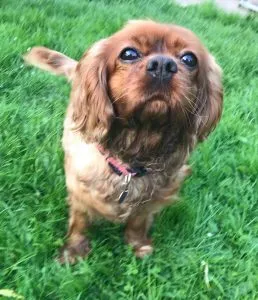At Dog Care Story, we frequently encounter Cavalier King Charles Spaniels with a range of behavioral problems. These can vary from severe issues like aggression towards humans or other dogs, to resource guarding behaviors that have escalated significantly in their previous homes. Our mission, as a dedicated rescue and training resource, is to provide high-quality support for these dogs and their fosterers, ensuring they receive the necessary guidance to manage and overcome these challenges. We believe in proactive training and the importance of recognizing subtle warning signs before problems intensify, allowing us to apply learned techniques effectively.
The Rescue’s Approach to Cavalier Behavior
Given our role as a rescue, it’s inevitable that many of the Cavaliers we take in require significant behavioral training before they can be considered ready for adoption. To address this, we ensure our foster team is fully supported 24/7 and equipped with fundamental knowledge on how to respond to various Cavalier King Charles Spaniel Behavior Problems. We collaborate closely with a professional behaviorist, guaranteeing that our fosterers consistently apply the same proven techniques and receive expert guidance throughout the rehabilitation process. This ongoing training is crucial, as both our human team and the dogs are constantly learning and adapting. Some behavioral issues inherently take longer to resolve or manage effectively than others, requiring patience and consistent effort.
Common Behavioral Problems in Cavalier King Charles Spaniels
Several behavioral issues are particularly prevalent among Cavalier King Charles Spaniels, often requiring careful management and professional intervention.
Resource Guarding
Resource guarding stands out as perhaps the most common behavioral issue we encounter, a trait fairly common across Spaniel breeds. This involves a dog showing defensive behaviors over possessions like food, toys, sleeping spots, or even people. Responding incorrectly to resource guarding can have serious consequences for both the dog and its owner. It can be especially challenging to manage in households with young children, who may not understand the warning signs and could inadvertently get hurt. If you are experiencing resource guarding with your Cavalier and find the situation difficult or unsafe to manage, seeking professional help is vital. The Association of Pet Dog Trainers offers a useful resource for finding local, qualified trainers: https://apdt.co.uk/find-a-trainer/
Separation Anxiety
 Cavalier King Charles Spaniel looking anxious, a common sign of separation anxietySeparation anxiety is another frequently observed behavioral problem in Cavaliers. We anticipate that the global lockdowns during the COVID-19 pandemic may exacerbate this issue, as many dogs became accustomed to constant human presence for extended periods. As owners return to work and dogs are left alone for longer durations, many Cavaliers may struggle to cope, manifesting signs of anxiety.
Cavalier King Charles Spaniel looking anxious, a common sign of separation anxietySeparation anxiety is another frequently observed behavioral problem in Cavaliers. We anticipate that the global lockdowns during the COVID-19 pandemic may exacerbate this issue, as many dogs became accustomed to constant human presence for extended periods. As owners return to work and dogs are left alone for longer durations, many Cavaliers may struggle to cope, manifesting signs of anxiety.
Dog and Human Aggression
It is not uncommon for some of our foster Cavaliers to exhibit aggression towards other dogs or people they encounter, whether nearby or at a distance. This can manifest as barking, lunging, or growling and can be a source of significant embarrassment and stress for owners or fosterers when out in public. Addressing such aggressive cavalier king charles spaniel behavior problems requires careful behavior modification and often professional guidance.
Pain-Related Self-Guarding Behaviors
A particularly sad aspect of our work is that many Cavaliers arrive at the rescue with long-standing, undiagnosed painful conditions. These can include serious ailments such as Chiari Malformation, Syringomyelia, chronic spinal pain, or various arthritic conditions. Over time, these dogs learn to cope with their discomfort by tensing their bodies and guarding themselves, which often presents as behavioral issues. Such dogs frequently have shorter attention spans and may take a considerable amount of time to make progress, even once their pain is effectively managed through veterinary care. It is crucial to remember: Always consult a veterinarian if your Cavalier suddenly develops behavioral issues, as there could be an underlying medical problem.
Conclusion
Managing cavalier king charles spaniel behavior problems requires understanding, patience, and a commitment to positive reinforcement. By recognizing common issues like resource guarding, separation anxiety, aggression, and pain-induced behaviors, owners can proactively address challenges. Early intervention and seeking professional guidance from qualified behaviorists or veterinarians are key to ensuring your Cavalier lives a happy, well-adjusted life. Remember, your dedication to understanding and addressing their needs forms the foundation of a strong, healthy bond.
